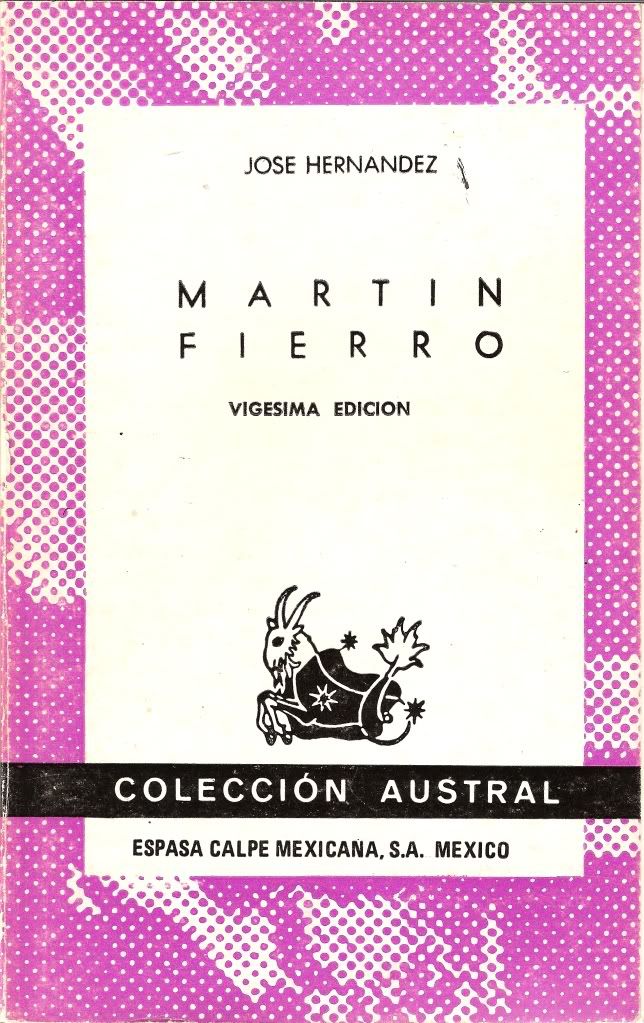
Martin Fierro is a two-part epic poem about a nineteenth century gaucho of the same name. It belongs stylistically to a tradition of gauchesque poetry, written not in traditional Spanish but in a Spanish filtered through the language, wordplay and lyrical traditions of the rural life of Argentina.
The first part of the poem, "The Gaucho Martin Fierro" introduces us to the character of Fierro, a poor and uneducated, but basically decent gaucho who lives with his common-law wife and children and eeks out a a basic existence. Trouble begins when he is pressed into military service by the authorities (a common occurrence at the time) and sent to serve on the frontier with the "unsettled" lands ruled over by fierce tribes of Pampas and Araucans. Here he is underpaid, underfed, poorly supplied, and generally mistreated. When he sees an opportunity, he flees back to the world he left behind. Later, the authorities catch up to him, and his resistance reveals such a depth of courage and nobility that he finds an unlikely ally in this struggle. Together, the two friends travel beyond the bounds of civilization.
"The Return of Martin Fierro" picks up several years later, with Fierro having found life in the wilderness much harsher than he expected. He returns to his home, where he meets up with the sons--all grown up now--whom he had to leave behind ten years prior. Together, they share stories of hardship and struggle, and of dealing with corrupt and callous authorities. While Fierro finds that the authorities have forgotten about his outlaw status, one act of violence from his past returns to haunt him and to leave the narrative with an ambiguous ending.
Martin Fierro is a sympathetic protagonist, though not without his flaws. He is not just an outlaw and a deserter, but also a brawler and a killer, though he is not without his sense of nobility. When contrasted to the authorities, which exert such power over him yet care little for his welfare, it becomes only natural to feel for the gaucho. I found the combination of the outlaw mystique and the realism of the gaucho's social marginalization to make for a moving tale.
To add to this, Fierro is not only a noble outlaw but also a musician, making his role as archetypal figure all the more noteworthy. The narrative is presented as one in which each of the main characters tell his own story in song, and the combination of musical performance with outlaw machismo struck me as just as deeply embedded in North American culture, whether you're talking of cowboys or gangstas. The climax of the second part involves a "payado," a sort of traditional gaucho song duel in which two guitar-players/singers trade off improvising songs on a theme.
The use of gauchesque style and language make for something of a double-edged sword, providing a unique feel while being potentially difficult to fully grasp. The edition I read was bilingual and thoroughly footnoted, which I found to be very helpful. I managed to understand it pretty well while reading the original, with only occasional glances to the translation. If your Spanish, like mine, is good but could be better, I recommend a bilingual edition. If you're more of a beginner, you're probably better off sticking to a translation, though much of the texture of the gauchesque language will be lost.
Marin Fierro is considered among the first classics of Argentine literature, and as with many a book that I'd heard much about, I approached it with a certain sense of wariness, fearing age would have dimmed its power. However, with its portrayal of a heroic criminal confronted by corrupt authority, and its beautiful and unique language, Martin Fierro certainly earns its classic status.



No comments:
Post a Comment